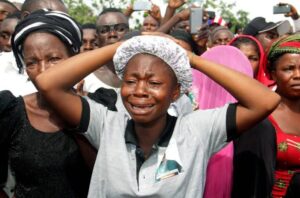


Afghanistan does not represent the only substantial change in this year’s rankings. Cuba moved to No. 27, up from No. 37, due to the intensification of repressive tactics against Christian leaders and activists opposing Communist principles. Prior to widespread demonstrations in 2021, it didn’t even rank. Burkina Faso moved to No. 23, up from No. 32, due to increased jihadist activity, exacerbated by similar instability in neighboring Sahel nations. Mozambique moved to No. 32, up from No. 41, due to Islamic militancy in its northern region. And Colombia moved to No. 22, up from No. 30, due to targeted violence against Christians by criminal gangs.
Comoros joined the list at No. 42, rising 11 spots due to increased government paranoia (only foreigners there are allowed religious freedom). And Nicaragua joined the list for the first time, rising 11 spots to No. 50 due to growing dictatorial repression, especially against the Roman Catholic Church.
Overall, other than Afghanistan dropping eight slots, the top 10 nations mostly shuffled positions from last year. Sudan rejoined the group at No. 10, bumping India which at No. 11 still scores within Open Doors’ “most extreme” level of persecution.
Surprisingly removed in 2021 from the US State Department’s annual listing of Countries of Particular Concern after finally being added in 2020, Nigeria was again given special attention in the Open Doors report, which noted:
Violence against Christians is most extreme in Nigeria where militants from the Fulani, Boko Haram, Islamic State West Africa Province (ISWAP) and others conduct raids on Christian communities, killing, maiming, raping and kidnapping for ransom or sexual slavery.
This year has also seen this violence spill over into the Christian-majority south of the nation. Nigeria’s government continues to deny this is religious persecution, so violations of Christian rights are carried out with impunity.
Repeating last year’s performance, Africa’s most populous nation ranked No. 1 in the WWL subcategories of Christians killed, abducted, sexually assaulted or harassed, forcibly married, or physically or mentally abused, as well as ranked No. 1 in homes and businesses attacked for faith-based reasons. It again ranked No. 2 in the subcategories of church attacks and internal displacement.
Violations of religious freedom in Nigeria are emblematic of a rapidly growing Islamist presence in Sub-Saharan Africa. Mali rose to No. 17 from No. 24. Burkina Faso rose to No. 23 from No. 32, and Niger rose to No. 28 from No. 33. Farther south, the Central African Republic (CAR) rose to No. 24 from No. 31; Mozambique rose to No. 32 from No. 41; and DRC rose to No. 37 from No. 40.
Countries with Christian majorities rank relatively low in the top 50, and include Colombia (No. 22), Central African Republic (No. 24), Cuba (No. 27), Ethiopia (No. 39), the Democratic Republic of the Congo or DRC (No. 37), Mozambique (No. 32), Mexico (No. 38), and Cameroon (No. 45), and Nicaragua (No. 50). (Kenya and Tanzania fall just short of making the 2023 list.)
Direct government oppression against Christians seen as voices of opposition is rife in Nicaragua (No. 50), Venezuela (No. 64), and Cuba (No. 27), where Christian leaders were imprisoned without trial for their part in last year’s demonstrations. many countries in Latin America, organized crime has taken hold, especially in rural areas for Christians who speak out against the cartels’ activities.
Of the top 50 nations; 11 have “extreme” levels of persecution and 39 have “very high” levels. Another five nations outside the top 50 also qualify as “very high”: Kenya, Kuwait, Tanzania, United Arab Emirates, and Nepal. (Then OD tracks another 21 with “high” levels. The only nations to rise in level were Nicaragua and Sudan, while Saudi Arabia and Sri Lanka were the only nations to drop in level.)
19 are in Africa, 27 are in Asia, and 4 are in Latin America.
34 have Islam as a main religion, 4 have Buddhism, 1 has Hinduism, 1 has atheism, 1 has agnosticism—and 10 have Christianity. (Nigeria is 50/50 Muslim-Christian.)
The 2023 list included two new countries: Comoros and Nicaragua. Two countries dropped off the list: Kuwait and Nepal.
Other noteworthy increases include Mali at No. 17, up from No. 24, due to threats from jihadist and mercenary fighters in the context of a weak government that links some Christians to Western interests. Similarly, fellow Sahel nation Niger rose to No. 28 from No. 33, due to ongoing attacks by Islamist militants. And in North America, Mexico rose to No. 38 from No. 43, due to criminal violence against Christians perceived to be a threat to illegal activity, as well as social pressures faced by indigenous believers who refuse to follow ancestral customs.
Not all noteworthy movement was negative. Open Doors noted the “promotion of greater tolerance” in a number of Middle Eastern countries, including Bahrain and the UAE. Qatar dropped 16 spots from No. 18 to No. 34, due to no churches being closed last year. (However, many previously closed house churches remained shut.) Egypt dropped 15 spots from No. 20 to No. 35, due to fewer reported attacks on Christian properties. Oman dropped for similar reasons from No. 36 to No. 47, and Jordan dropped from No. 39 to No. 49 due to no reports of Christians forced from their homes.
























